Katy Huth Jones's Blog, page 30
October 14, 2013
Balloon Therapy
[NOTE: I wrote this more than 20 years ago but decided to post because it's RAINING today in drought-stricken southwest Texas!]
 Rainy days and active boys do not mix. After a week being cooped up in the house with my two sons, I was ready to scream and pull out my hair.
Rainy days and active boys do not mix. After a week being cooped up in the house with my two sons, I was ready to scream and pull out my hair.
My husband suggested we go to the mall. He needed a haircut, and the boys could "stretch their legs" instead of bounding around the house because I wouldn't let them outside in the muddy pond that used to be our backyard.
Normally hubby's haircut took twenty minutes, tops. That day there was a long line as well as a new, nervous stylist. As the boys and I waited, my irritation of the past week grew and grew. I felt like the Grinch, and I sounded like him, too:
"Don't touch that! Sit down! Be quiet! Daddy will be finished in a few minutes."
A few minutes to a small boy is a long, long time.
The receptionist, bless her heart, gave each of the boys a balloon.
"Mommy, will you blow this up?"
"Oh, all right. But don't knock it around. Somebody might trip on it."
How do you give a boy a balloon and expect him to just sit and hold it?
I relented. We went out into the mall and found an uncrowded court. The boys went wild. They batted the balloon back and forth.
"Can you keep yours from touching the ground?"
"Look how high mine is!"
An older couple on the bench smiled fondly at the boys, even hit a balloon back when it floated their way.
By this time I was feeling like the Grinch when he sees that the Whos are still singing, even after he tried to ruin their Christmas.
"Here, Mommy," my three-year-old said. "Catch!"
I hit the balloon back to him, bopping him in the face. He squealed with delight, and his laughter always made me smile.
Pretty soon I was in the middle of the balloons, trying to hit both back at once, getting bopped in the face myself.
Something loosened inside me, and I felt calm and happy for the first time that stressful week. "And they say Mommy's small heart grew three sizes that day."
After a few minutes the game changed, and I was no longer included. But now I was content to watch. I never realized how much fun a balloon could be!
Hubby came out then, and the game ended. The boys' hair was damp with sweat and they smelled a little gamey. But they too had changed (or maybe it was just my perception). No whining, no fighting, just contentment.
By the next day the balloons lost air or burst and were thrown away. But I will never forget the joy of that moment when our frustrations disappeared and we could share something as simple as a balloon in a shopping mall.
I even managed to remember this lesson the next rainy week when I turned into a Grinch.

 Rainy days and active boys do not mix. After a week being cooped up in the house with my two sons, I was ready to scream and pull out my hair.
Rainy days and active boys do not mix. After a week being cooped up in the house with my two sons, I was ready to scream and pull out my hair.My husband suggested we go to the mall. He needed a haircut, and the boys could "stretch their legs" instead of bounding around the house because I wouldn't let them outside in the muddy pond that used to be our backyard.
Normally hubby's haircut took twenty minutes, tops. That day there was a long line as well as a new, nervous stylist. As the boys and I waited, my irritation of the past week grew and grew. I felt like the Grinch, and I sounded like him, too:
"Don't touch that! Sit down! Be quiet! Daddy will be finished in a few minutes."
A few minutes to a small boy is a long, long time.
The receptionist, bless her heart, gave each of the boys a balloon.
"Mommy, will you blow this up?"
"Oh, all right. But don't knock it around. Somebody might trip on it."
How do you give a boy a balloon and expect him to just sit and hold it?
I relented. We went out into the mall and found an uncrowded court. The boys went wild. They batted the balloon back and forth.
"Can you keep yours from touching the ground?"
"Look how high mine is!"
An older couple on the bench smiled fondly at the boys, even hit a balloon back when it floated their way.
By this time I was feeling like the Grinch when he sees that the Whos are still singing, even after he tried to ruin their Christmas.
"Here, Mommy," my three-year-old said. "Catch!"
I hit the balloon back to him, bopping him in the face. He squealed with delight, and his laughter always made me smile.
Pretty soon I was in the middle of the balloons, trying to hit both back at once, getting bopped in the face myself.
Something loosened inside me, and I felt calm and happy for the first time that stressful week. "And they say Mommy's small heart grew three sizes that day."
After a few minutes the game changed, and I was no longer included. But now I was content to watch. I never realized how much fun a balloon could be!
Hubby came out then, and the game ended. The boys' hair was damp with sweat and they smelled a little gamey. But they too had changed (or maybe it was just my perception). No whining, no fighting, just contentment.
By the next day the balloons lost air or burst and were thrown away. But I will never forget the joy of that moment when our frustrations disappeared and we could share something as simple as a balloon in a shopping mall.
I even managed to remember this lesson the next rainy week when I turned into a Grinch.

Published on October 14, 2013 07:45
October 11, 2013
My most embarrassing moment
Being a lifelong klutz, I've had my share of embarrassing moments. But the worst of all had nothing to do with klutziness, and thankfully did not permanently scar that sensitive little girl.
When I tell people I've been writing stories since I could hold a pencil (or crayon), I'm serious. In fact, to prove it, here's a copy of my first check and the accompanying letter (although the "junior press card" was lost long ago):
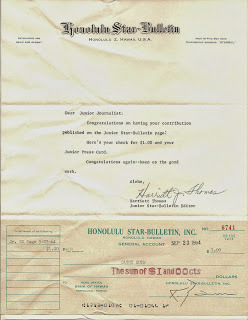 Hmm, think I could cash this check? It's only 49 years old, after all.This was in first grade. By the third grade I was so inspired by the U.S. space program I was writing epic science fiction adventures about intelligent ants visiting all the planets in the solar system (illustrated, of course). My teacher, Mrs. White, was so impressed with one of my stories--all 20 pages--she asked me to read it out loud to the class near the end of the school day.
Hmm, think I could cash this check? It's only 49 years old, after all.This was in first grade. By the third grade I was so inspired by the U.S. space program I was writing epic science fiction adventures about intelligent ants visiting all the planets in the solar system (illustrated, of course). My teacher, Mrs. White, was so impressed with one of my stories--all 20 pages--she asked me to read it out loud to the class near the end of the school day.
I whispered to her that I needed to go to the bathroom first. Since I was shy, Mrs. White thought I was just trying to get out of reading the story and wouldn't let me go.
So I tried to read as fast as I could, but 20 pages is a very long story for an eight-year-old. I danced from foot to foot, but--you guessed it--I couldn't hold it. So in front of a whole class of third graders, my white socks turned yellow. (Those of you who grew up in the sixties will remember how us girls wore dresses to school, and that day I wore white socks with my saddle oxfords.)
I managed to finish the story without bursting into tears (I'm German, after all), and squished all the way back to my desk, where I planted myself until the final bell. When I didn't get up, Mrs. White came to investigate, and when she realized what had happened was mortified and helped me clean up.
The rest of the year I made sure my stories were not quite so long. And when I later had opportunity to teach children of all ages, I always, ALWAYS let them go to the bathroom.
P.S. I can also tell you this did nothing to discourage my interest in writing epic stories. ;)
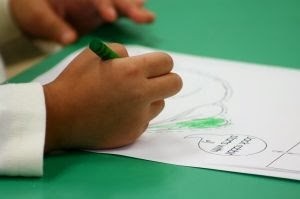
When I tell people I've been writing stories since I could hold a pencil (or crayon), I'm serious. In fact, to prove it, here's a copy of my first check and the accompanying letter (although the "junior press card" was lost long ago):
 Hmm, think I could cash this check? It's only 49 years old, after all.This was in first grade. By the third grade I was so inspired by the U.S. space program I was writing epic science fiction adventures about intelligent ants visiting all the planets in the solar system (illustrated, of course). My teacher, Mrs. White, was so impressed with one of my stories--all 20 pages--she asked me to read it out loud to the class near the end of the school day.
Hmm, think I could cash this check? It's only 49 years old, after all.This was in first grade. By the third grade I was so inspired by the U.S. space program I was writing epic science fiction adventures about intelligent ants visiting all the planets in the solar system (illustrated, of course). My teacher, Mrs. White, was so impressed with one of my stories--all 20 pages--she asked me to read it out loud to the class near the end of the school day.I whispered to her that I needed to go to the bathroom first. Since I was shy, Mrs. White thought I was just trying to get out of reading the story and wouldn't let me go.
So I tried to read as fast as I could, but 20 pages is a very long story for an eight-year-old. I danced from foot to foot, but--you guessed it--I couldn't hold it. So in front of a whole class of third graders, my white socks turned yellow. (Those of you who grew up in the sixties will remember how us girls wore dresses to school, and that day I wore white socks with my saddle oxfords.)
I managed to finish the story without bursting into tears (I'm German, after all), and squished all the way back to my desk, where I planted myself until the final bell. When I didn't get up, Mrs. White came to investigate, and when she realized what had happened was mortified and helped me clean up.
The rest of the year I made sure my stories were not quite so long. And when I later had opportunity to teach children of all ages, I always, ALWAYS let them go to the bathroom.
P.S. I can also tell you this did nothing to discourage my interest in writing epic stories. ;)

Published on October 11, 2013 07:09
October 9, 2013
A Gift So Precious
 Sixteen years ago this month, a tragedy occurred in San Antonio. A van carrying students to a football game overturned. Fifteen-year-old Jessica suffered severe head trauma and was declared brain dead.
Sixteen years ago this month, a tragedy occurred in San Antonio. A van carrying students to a football game overturned. Fifteen-year-old Jessica suffered severe head trauma and was declared brain dead.That night Jessica's mother agonized over the decision to discontinue life support and let her daughter go. She envisioned a thousand mothers sitting beside their children's hospital beds, agonizing as she was, but with one important difference: whereas she had no hope that Jessica would recover, these mothers could save their children, if donated organs could be found.
That vision enabled Jessica's parents to give the ultimate gift--the donation of their daughter's organs.
After hearing about the accident on the radio, the next day I received a call that a cornea was waiting for me. I couldn't help but wonder if the cornea came from one of the students in that accident, so much so that I became ill upon arriving at the eye surgical center in San Antonio; I felt unreasonable guilt that a young person had to die in order for sight to be restored in my diseased eye.
Because I had to be awake for the procedure, I was able to see when the old cornea was cut away, revealing a perfect circle of light. I even saw the new cornea held by forceps as the surgeon placed it on my eye, and I could discern the curved needle as it sewed this precious gift into place. The next morning I could see the large "E" on the vision chart, something I hadn't been able to do in a long time!
After my recovery I visited the San Antonio Eye Bank and learned about the procedure for organ donation, from the original contact by a nurse trained to approach suffering families to the methods of organ procuration and storage. I looked under the microscope to see how corneal cells were counted to make sure they were viable for transplant. All of this was interesting, but it didn't help my lingering guilt.
Then a woman at the eye bank told me about an upcoming "reunion" for donor families. They were going to plant a tree in memory of their loved ones. A few would speak to the crowd. She asked if I would be willing to tell my story.
When I arrived at the reunion, I was seated next to Jessica's mother, who was scheduled to speak just before me. I told her about receiving the call for the cornea right after the accident. She hugged me and said it made her happy to think that because of Jessica, a mother like me could see her own child clearly.
Then she got up to tell her story. Though tears ran down her face, her voice was clear and strong. She said she believed her decision, although more painful than she could ever have imagined, was the right one, one that would have pleased the unselfish Jessica.
I was so choked up listening to this brave woman, I wasn't sure I could speak. I'd planned to read from notes, but as I looked into the faces of these bereaved people, I spoke from the heart. I explained that I had an eye disease for which there was no cure. I talked about my first transplant, at the age of four, and how the disease had eaten through that cornea, too. I even told them about how I'd put off this second transplant for so long because I felt guilty, and how I still had those feelings.
By the end, when I thanked them all for the wonderful gift they'd given, I told them that every day, when I looked through my clear, beautiful cornea, I remembered a mother's sacrifice and held her and her child in my heart. Then I started crying, too.
Afterwards, total strangers came up and hugged me, telling me I should never feel guilty. By donating their loved one's organs, it helped their grief, knowing someone's sight was improved, or a liver or kidney had saved another life. By that they felt their lost one's death was not in vain. It gave them comfort.
And finally, I began to find comfort, too.
Although I later found out I didn't have Jessica's cornea, but that of a seventeen-year-old boy, I will hold both of these young people in my heart for as long as I live. I will never forget their courageous parents for giving me and others a gift so precious that there are no words sufficient to say thank you.

Published on October 09, 2013 06:42
October 7, 2013
Germanic pentameter
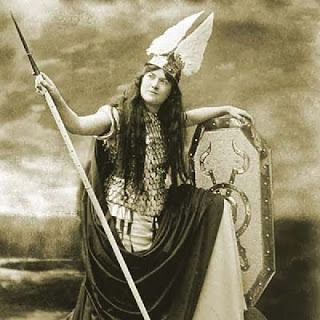 The older I get, the more I realize I have been shaped by my father's German heritage. Since I was a young child I've been a stickler for "following rules," and during rehearsals for our symphony's latest concert ("The French Connection" which was all songs by French composers) I realized I prefer listening to AND playing Baroque and Classical music by the German composers: Bach, Handel, Mozart, Beethoven, Brahms, Wagner. You get the picture.
The older I get, the more I realize I have been shaped by my father's German heritage. Since I was a young child I've been a stickler for "following rules," and during rehearsals for our symphony's latest concert ("The French Connection" which was all songs by French composers) I realized I prefer listening to AND playing Baroque and Classical music by the German composers: Bach, Handel, Mozart, Beethoven, Brahms, Wagner. You get the picture.Perhaps my regimented self-discipline is also the source of my preference for reading and writing structured poetry. When I discovered the sonnet form in ninth grade, I fell in love--not with the "love" themes for which the sonnet form is famous, but with the strict construction of both Shakespearan and Petrarchan sonnets. Paradoxically my poetic creativity is unleashed when there is a skeletal form upon which to add the sinews, muscles, and flesh of words.
Here is my first sonnet, written in high school (yes, I still have my worn-out notebook of hand-written poetry):
Sonnet I: The Cockroach
I do believe I fear all nature's pests,
But most especially the cockroach here.
He looks most fearsome in his coat and vests,
But hairy legs are what I really fear.
I dread the morbid clicking of his wings,
Though knowing his intentions are meant well--
It's just that I abhor all crawly things,
And worst of all, they wish with me to dwell!
It's quite unnerving when you wake at night
To see two beady eyes atop your chest--
You jump and scream with horror and with fright,
And then discover he's brought all the rest.
So if eternity for me is hell,
I'm sure it's in the cockroach citadel.
I also learned how to use the "love" theme, too. This one actually has a date: December 29, 1975:
Sonnet III
My love is all I have to offer thee,
And knowing that you know my love is real,
I ask an answer to my final plea,
And humbly wait with patience and with zeal.
I haven't long to wait, for now I see
A lifetime in eternity is short;
It's now or never that I make my plea,
For as you see it's now my last resort.
If I had beauty, grace, or face so fair
With skin as sweet and pure as honeydew,
Or hair and eyes to shame the brightest star,
Then I'd love me the best and not love you.
But not for me these blessings from above,
So all I have to offer you is love.
One of the most enjoyable classes I've ever taught to children is poetic forms. It was an especially delicious challenge if I had one or more students (usually boys) who "hated" poetry. In every single instance, by the end of my classes they had learned to love poetry, mainly because they didn't realize playing with words could be so much fun.
So, in the spirit of poetry classes past, I'm posting some iambic pentameter "starters" for a sonnet, blank verse, or a poem of your own construction, taken from those I made up for my classes. (In case it's been a few years since you learned about poetic forms, an iamb is a poetry foot with a soft first syllable and a hard second syllable--da DUM. Therefore iambic pentameter is a line composed of five iambs: da DUM, da DUM, da DUM, da DUM, da DUM.)
My beagle is a sweet but stupid pet
My father is a famous fighter ace (or "boxing champ" etc.)
My mommy loves to hug and kiss on me
My brother is a hyperactive boy
I have a large iguana in my room
There is a crocodile beneath my bed
I woke up with my hair all tied in knots
It seems the world is really quite insane
My tennis shoes can bounce me very high
Computers make the strangest time machines
A book is an adventure, don't you see?
If you were me, it follows I'd be you
It's raining, raining, raining all the time
I really like to write in sonnet form
 Dem Deutschen Volke
Dem Deutschen Volke
Published on October 07, 2013 07:58
October 4, 2013
The Powerful Language of Music
 A few years ago the high school band director called me. I taught his flute students in sectionals as well as privately. "The activity director at the State Hospital asked if a few students could play Christmas music for some of their residents. Are you interested?"
A few years ago the high school band director called me. I taught his flute students in sectionals as well as privately. "The activity director at the State Hospital asked if a few students could play Christmas music for some of their residents. Are you interested?"I agreed, not understanding what I was getting into. I'd taken my students to play at nursing homes and the "regular" hospital, so I figured this was the same kind of gig.
It wasn't.
Five girls met me at the guardhouse to the gate, which was the only way in or out. A high wire fence surrounded the property. It reminded me of a prison. The activity director sent a woman to meet us. She carried a large ring of keys, like a medieval jailer. "I'll be your escort," she said with a smile.
The girls and I looked at one another? Escort? At the nursing homes we'd simply set up in the activity room and played for the residents.
We followed our guide to a locked ward. When we entered there were a few harried-looking nurses at a desk surrounded by catatonic elderly patients secured in their wheelchairs or recliners. It was hard to tell if they were even alive. But we set up our stands and music and began to play: Six flutes harmonizing happy Christmas songs to unsuspecting state hospital residents. It was unsettling to have such an unresponsive audience.
During an especially beautiful arrangement of "Greensleeves" I happened to glance at the woman nearest me. She reclined in a mobile chair, worn hands folded limply across her "seatbelt." Though her eyes were closed and her mouth never moved, tears glistened on her cheeks. Somewhere deep inside her prison walls she heard our music and responded to it.
When we finished our several prepared tunes, the nurses clapped, all smiling now, and we packed up to follow our escort to another ward, where several young women either sat listlessly on chairs and sofas, or paced and muttered to themselves, ignoring us. Our guide explained that these were all drug "burn-outs" but they were harmless, unlike some of the other patients, for which we would not be playing.
As soon as we began playing, one young woman walked up to me and with her face less than 12 inches from mine began to "direct" us in time, humming along with each tune. It was challenging to play with her so close, but I would not have interrupted her joy for anything: she grinned wide, participating fully in our performance.
At the end of our performance, this young woman thanked us by shaking each of our hands. Drugs had stolen her language skills, but not her appreciation of melody and rhythm.
Before our escort unlocked the last door, she hesitated. "I think it will be all right for you to play here. They are pretty loud and rowdy and won't appear to be paying attention, but they won't hurt you either."
This chaotic ward was comprised of middle-aged men who were talking loudly, laughing, and wandering around as if they were inside a pinball game. None of them even noticed we were there, but the moment we began playing, every one of them rushed to the chairs and sat quietly, focused on the music. Even in the brief silence between songs they did not resume their chattering, but waited patiently for the next one.
After the last song, when they realized we were leaving, they resumed their chatter, but not quite as loudly as before. The escort was amazed. She said they'd NEVER been so quiet for so long before.
When we reached the front door, our escort thanked each of us for bringing a gift of Christmas cheer. But I should have thanked her for the remarkable gift we'd received. For years I'd heard the saying, "Music is the universal language," but now I knew for certain it was true. These state hospital residents could no longer communicate verbally, but they could definitely understand the message we shared when we played from our hearts--to theirs.

Published on October 04, 2013 08:11
October 2, 2013
Rules for Writers (more what you'd call guidelines than actual rules)
For years I read the advice in writer's magazines: "Study the publication before submitting."
And for years I ignored that advice. Of course, I wondered why I couldn't sell any of my stories!
Sometimes I read the magazine. Once I even bought a subscription. Sometimes I sent for writer's guidelines. But because of new writer enthusiasm I never really studied what each magazine was publishing.
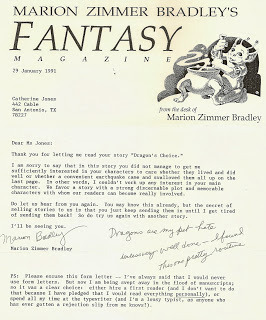 One of three rejection letters I received from MZB before she accepted one of my stories.
One of three rejection letters I received from MZB before she accepted one of my stories.
After three rejections by the same editor, I decided it couldn't hurt to take that oft-repeated advice. I wanted to write for her anthology. There were several in print, so I found most of them at Half-Price Books and/or the library.
And I studied them.
I not only read the stories, but I read the editor's comments in her introductions to each story. I discovered I'd been sending her stories and themes she would NEVER publish! I'd been hopelessly clueless, and I hoped she'd give me another chance.
So I wrote another story, this time avoiding the editor's taboos as well as incorporating humor, which she "could not get enough of."
And--surprise!--I sold the story, which was also my first fiction sale.
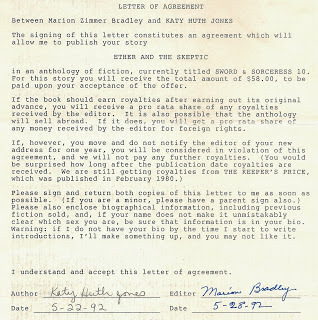
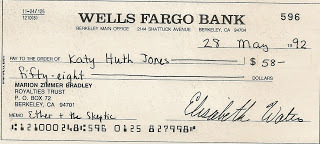 Advance was $0.02/word but over 14 years earned several hundred dollars in royalties
Advance was $0.02/word but over 14 years earned several hundred dollars in royalties
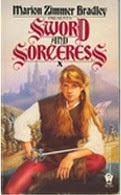 When a second sale didn't come right away, I took a writing friend's advice and sent out queries for nonfiction articles. But FIRST I studied the publication and its guidelines to discover exactly what the magazine needed.
When a second sale didn't come right away, I took a writing friend's advice and sent out queries for nonfiction articles. But FIRST I studied the publication and its guidelines to discover exactly what the magazine needed.
When my query was given the go-ahead on spec, I typed out a similar article to get a "feel" for length, style, intro and ending, etc. Then I "slanted" my article to fit the magazine's requirements.
And, not quite so surprising this time, I sold the article.
I think the second sale was even more satisfying than the first. I had begun to believe the first acceptance was a fluke and would never happen again!
Since 1992 the publishing world has definitely changed, but there are still "rules" and "guidelines" to be followed. As with any creative endeavor, more than enthusiasm and even talent is required to be successful. It takes continuous self-education, re-dedication, and persistence to find success, no matter how humble.
And for years I ignored that advice. Of course, I wondered why I couldn't sell any of my stories!
Sometimes I read the magazine. Once I even bought a subscription. Sometimes I sent for writer's guidelines. But because of new writer enthusiasm I never really studied what each magazine was publishing.
 One of three rejection letters I received from MZB before she accepted one of my stories.
One of three rejection letters I received from MZB before she accepted one of my stories.After three rejections by the same editor, I decided it couldn't hurt to take that oft-repeated advice. I wanted to write for her anthology. There were several in print, so I found most of them at Half-Price Books and/or the library.
And I studied them.
I not only read the stories, but I read the editor's comments in her introductions to each story. I discovered I'd been sending her stories and themes she would NEVER publish! I'd been hopelessly clueless, and I hoped she'd give me another chance.
So I wrote another story, this time avoiding the editor's taboos as well as incorporating humor, which she "could not get enough of."
And--surprise!--I sold the story, which was also my first fiction sale.

 Advance was $0.02/word but over 14 years earned several hundred dollars in royalties
Advance was $0.02/word but over 14 years earned several hundred dollars in royalties
 When a second sale didn't come right away, I took a writing friend's advice and sent out queries for nonfiction articles. But FIRST I studied the publication and its guidelines to discover exactly what the magazine needed.
When a second sale didn't come right away, I took a writing friend's advice and sent out queries for nonfiction articles. But FIRST I studied the publication and its guidelines to discover exactly what the magazine needed.When my query was given the go-ahead on spec, I typed out a similar article to get a "feel" for length, style, intro and ending, etc. Then I "slanted" my article to fit the magazine's requirements.
And, not quite so surprising this time, I sold the article.
I think the second sale was even more satisfying than the first. I had begun to believe the first acceptance was a fluke and would never happen again!
Since 1992 the publishing world has definitely changed, but there are still "rules" and "guidelines" to be followed. As with any creative endeavor, more than enthusiasm and even talent is required to be successful. It takes continuous self-education, re-dedication, and persistence to find success, no matter how humble.
Published on October 02, 2013 07:40
September 30, 2013
Dumber Than Dirt but One Lucky Pup
I’ve had many dogs in my life, but the one who’s lived with us the last fourteen years had a shaky beginning.
She came to us from the animal shelter. My son Robert and I liked her because she sat quietly in her kennel, looking at us with big, sad eyes, while all the others were barking. The lady at the animal shelter had tied a bandanna around her neck and called her Bandit, but Robert started calling her Bandi.
The shelter identified her as a “dachshund mix” but she looked more like part Corgi, part Sheltie, and the rest an impossibly long feathered tail which she held up like a sail at full mast. Her hair was reddish gold and silky soft, and she had four white socks.
Bandi was a "chewer." She gnawed off the bottom corners of the back door frame (and, among other things, her dewclaws) but she wouldn't chew bones; she'd bury them, usually by uprooting plants I wanted to keep. One evening our internet suddenly went out. When we discovered the phone was dead, too, we checked the line into the house. Using a flashlight, we found Bandi had pulled off the wire and eaten most of it. After that when anything was missing, we assumed Bandi had eaten it.
We had a mesquite tree in the back yard. The first notch where the branches divided was about four feet from the ground. One day Bandi forgot she was a dog while chasing a squirrel. She ran up the trunk and sat in the notch, barking at the squirrel who, of course, climbed much higher.
After that Bandi loved to show off for visitors, running up the rough trunk of the mesquite tree to sit in "her" place. She also preferred to sit on top of her doghouse a la Snoopy rather than sleep inside.
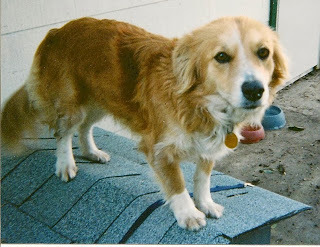 One evening when she was about eighteen months old, Bandi was in the backyard when it began to rain lightly and we could hear thunder far away. She managed to open the gate and run around to the front porch. Since she had a dog house and it was barely raining, we put her back in the yard and closed the gate.
One evening when she was about eighteen months old, Bandi was in the backyard when it began to rain lightly and we could hear thunder far away. She managed to open the gate and run around to the front porch. Since she had a dog house and it was barely raining, we put her back in the yard and closed the gate.A little while later, about ten o’clock, I heard a car race up the street, hit something, and then a dog crying. I looked out the window and saw a dog pull itself up in the neighbor’s yard under the street light. I thought, “How terrible! Someone has hit a dog.” And then I felt sick in the pit of my stomach. I asked my husband to look outside and see if Bandi was in the yard. She wasn’t.
I grabbed a big towel and ran outside in my nightgown. Sure enough, it was Bandi. I could tell she was in pain, but I couldn’t tell what her injuries were, so I wrapped her in the towel and carried her back to the house. I laid her on the kitchen floor. There was some blood, but not a lot. She tried to bite us if we touched her back leg, and I thought she might have internal injuries.
My husband looked in the phone book and started calling veterinarians. He found one on call who said to bring her in. I thought we should all go, because I didn’t want to wake up Robert the next morning to tell him his dog was dead.
We woke Robert and he quickly dressed. He and I sat in the back seat with Bandi while my husband drove across town. Bandi was hurting so badly that she nipped at us whenever her leg was moved. The vet didn’t think she had internal injuries, but he said her back thigh bone had snapped in two. He would have to keep her so he could insert a rod in the leg the following morning. He said to come back at four o’clock to pick her up.
When Robert and I arrived, Bandi heard us coming through the door. I had read about “mournful howls” but that was the first time I’d heard one! A cast held her back leg out straight, so she had to hop around on three legs. Before her leg healed she managed to chew through the cast and had to get another one.
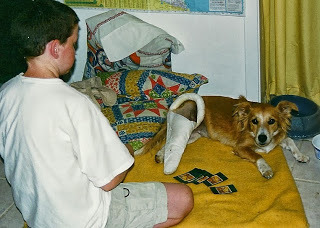
But I guess she’s a little smarter than dirt. She doesn’t try to escape the backyard any more. She knows bad things can happen outside the gate….
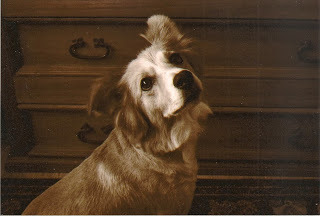
Published on September 30, 2013 09:58
September 26, 2013
Writing with Mrs. Jones
 My former author name which happens to be my legal name.It began when a new teacher asked if I would come talk to her classes about "the job of a writer." My favorite part of being a children's writer is classroom visits.
My former author name which happens to be my legal name.It began when a new teacher asked if I would come talk to her classes about "the job of a writer." My favorite part of being a children's writer is classroom visits.This visit, however, had a unique outcome. At the end of the day, the teacher called me aside.
"I haven't taught in fifteen years," she confided to me. "I've never taught sixth grade, and I took this English job because it was the only one open. Because I'm the new teacher, they gave me the most difficult students, and I don't really know how to teach them to write. Would you be willing to help me?" She was willing to pay me out of her own pocket, she was that desperate. How could I say no?
So for the last three months of school I came every Friday to her three classes, each one two hours long to include grammar and composition. The objective on the board: " Writing with Mrs. Jones "
A new boy came to sixth period class. "John is a troublemaker," other teachers said. "He has serious problems." "Don't let him get away with ANYTHING," said the principal.
Great. Sixth period already had its share of troublemakers.
Enter John: a tall, lanky boy, older than the other kids, nice-looking but craving attention so badly he didn't mind disrupting the entire class--even the entire school.
Friday came: " Writing with Mrs. Jones "
"Who are you?" asked John. "Are you like Judy Blume, or something?"
"Or something," I said with a weak smile. "I'm a published author. Someday I plan to be like Judy Blume, or something."
At first he resisted. At first he was sent to the principal's office every Friday because he wouldn't cooperate and would not let the others write.
Without John we wrote first-person narrative, using all five senses. We wrote "telegrams" to find the theme of a piece. We cut and pasted sequences. We cut and pasted objective/subjective terms from magazine ads. (These tough-acting sixth graders really liked using scissors and paste.)
With John we learned how to dig for facts, write a rough draft, and then a final draft for a report about whales, with colorful illustrated covers. We wrote poetry and made our own poetry books. We learned how to write "an awesome essay."
Some of the students wrote well. Even the most hardened kids showed glimpses of coherent, almost brilliant thought.
John enjoyed expressing himself in words. "How does this sound, Mrs. Jones?" he would ask. "Do you really like it?" He turned out to be a promising artist, too.
I lost sleep worrying about John. I wished I could make such a positive impact on the boy that he would turn away from the self-destructive path he was bent on pursuing. We did become friends, at least. He always greeted me whenever our paths crossed in our small town.
Though I did not influence John in a big way, he has kept a piece of my heart all these years. When the press of life tries to crowd out my love of writing, I remember him, and I realize I can never quench this fountain of words. I never know whom I may reach with a word of hope, no matter how fleeting.
Besides, I promised John that someday I would be like Judy Blume--or something.
Published on September 26, 2013 08:10
September 23, 2013
The Rooster Crowed
 The first time I met John Dickey, he made me nervous. Wheelchair-bound, he sat at the fringe of nursing home residents while a group of us college students sang hymns with them. He was a large man with a full head of white hair, but he was missing both legs, from diabetes as I later discovered. His long fingers looked strong, but they trembled from Parkinson's disease.
The first time I met John Dickey, he made me nervous. Wheelchair-bound, he sat at the fringe of nursing home residents while a group of us college students sang hymns with them. He was a large man with a full head of white hair, but he was missing both legs, from diabetes as I later discovered. His long fingers looked strong, but they trembled from Parkinson's disease.When we finished our songs, I made myself speak to him.
"Nice to meet you, young lady." His gruff voice did not match his smile. "I hope you'll come back."
I did go back. Mr. Dickey soon discovered I knew how to type and asked me to come to his room. I hadn't been inside nursing homes before. The odor of disinfectant trying to disguise even less pleasant odors made my stomach queasy.
Unlike most of the residents, Mr. Dickey had a private room. His walls were covered with photographs of his children and grandchildren, pictures they'd drawn, and one small piece of white cardboard with neatly printed letters:
Mortal I know I am, short lived;And yet, wheneverI watch the multitude of swirling starsthen I no longer tread this earth,but rise to feast with God,And enjoy the food of the immortals.
* * * * * * * * * * * * * * * * * * *
Did you ever hear a dead rooster crow?Did you ever see a live rooster that didn't crow?When equated to the human specie these facts meanWhen a man quits bragging, people lose interest in him.
Mr. Dickey turned out to be a writer; these were just two of his poems. He was working on two novels, he said. One described his days in the Marine Corps just after World War I, and the other was a romance about two teenagers. A clean one, he assured me. He showed me his yellow legal pads with pages and pages of his shaky script. Because of the Parkinson's, he had to put the pen in one hand and hold it with the other to at least partially steady it.
"No one can read my writing," he said mournfully. "Can you?"
I worked part-time for a radiologist. Mr. Dickey's handwriting was no problem for me to read.
"Could you type my stories? I'll pay you." He no longer seemed big and gruff. He reminded me of a small, hopeful child.
Every Friday afternoon for two years I went to his room and typed on his electric typewriter, using messy carbon paper to make an extra copy of his manuscripts. Through his writing I learned what a noble and generous person I'd met. At first the arrangement was for our mutual benefit--very quickly we became friends, too.
Mr. Dickey dreamed of publishing his books, but unfortunately he died before that could happen. He will never know how much I learned from his sense of humor and his example of perseverance. He taught me the power of hope.
I wish I'd thought to thank him, but I didn't know until it was too late that we shared the same writing dream.
So, Mr. Dickey, this crow's for you!

Published on September 23, 2013 14:02
September 20, 2013
Reflections on 20+ Years of Homeschooling
By the time our oldest son, David, was 18 months old, I knew he wouldn't make it in a regular classroom environment. He scared me! He had an insatiable curiosity and a photographic memory coupled with an extremely strong-willed personality. He learned his alphabet and numbers before he was two years old and taught himself to read at age three, even though he was so active it was hard for him to sit still for more than thirty seconds. I went back to college to finish my teaching degree so I could open a private school, but my husband lost his job and we had to move. I never did finish that degree.
 David age 18 monthsThis was 1984 and I had never heard of homeschooling. Providentially a friend took me to a Gregg Harris convention in Austin. Wow! I was hooked! We began with "preschool" in 1986 while I worked on a homemade kindergarten program, which we started in August 1987 (we couldn’t afford curriculum at that time, and David didn’t need more than thirty minutes each day of “formal instruction” anyway). He and I went to the library once a week and loaded up on books. I made math manipulatives out of whatever was handy. We made craft items almost daily to help with fine motor skills and to use for gift-giving on our extremely limited budget. And beginning that year we invited other homeschoolers to a weekly music class in our tiny living room.
David age 18 monthsThis was 1984 and I had never heard of homeschooling. Providentially a friend took me to a Gregg Harris convention in Austin. Wow! I was hooked! We began with "preschool" in 1986 while I worked on a homemade kindergarten program, which we started in August 1987 (we couldn’t afford curriculum at that time, and David didn’t need more than thirty minutes each day of “formal instruction” anyway). He and I went to the library once a week and loaded up on books. I made math manipulatives out of whatever was handy. We made craft items almost daily to help with fine motor skills and to use for gift-giving on our extremely limited budget. And beginning that year we invited other homeschoolers to a weekly music class in our tiny living room. In 1987 the Leepercase was not yet finalized, so it was still a scary time to be a homeschooler, especially in Waco, where the local superintendent was actively looking for homeschoolers to charge with truancy. Although we joined the small local group, we all kept a low profile during school hours. We met twice a month, for park day and roller skating. Several of us participated in homeschool rallies at the Capitol and became involved in local politics, facing belligerent older people at the precinct and county conventions when we introduced our resolutions on homeschooling to be added to the party platform. We did what we could to “educate” the skeptics, but most of the time it seemed an uphill battle.
One incident stands out from that time during the Presidential elections of 1988. I took David with me to vote that Tuesday in November. The election clerk at the desk frowned when he saw this just-turned-six-year-old roaming around during school hours.
“Why aren’t you in school?” he asked.
“I have school at home,” David answered.
“Hmph,” said the man. He pointed to the word “READ” on the sign in front of him. “What does that say?”
David did not know he was being “tested.” He glanced at the sign and read the whole thing: “Please read through your entire ballot before you begin marking.”
The man’s eyes nearly popped out of his head. “That’s a fine boy you have there.”
That was the same fall we began using ABeka. I had saved during our first year so I could buy “real” school books for David’s first grade year. He read through the social studies and science books the first week and said, “Is this all?” Until he was in high school we only bought math and language books and I made unit studies for the other subjects. That was so much fun! I wish I’d had the “nerve” to keep going with unit studies even through high school, but since those grades “counted” for college, I thought we had to use “real books.” Big mistake! David used to love history and science until he had to use boring textbooks.
From the beginning I had to "gird up the loins of my mind" and stand by my convictions to teach David against the opposition of nearly everyone around me: parents, in-laws, church members, friends, neighbors, total strangers. I felt like I was constantly defending homeschooling, even to my husband, who wasn't fully convinced but "humored me."
The certified teachers said I wasn't "qualified" to teach my son. A special ed teacher said my son needed "help" because he was obviously ADHD. Well-meaning church members said he would be socially inept and educationally deprived because of all the "gaps" in our learning and all the "experiences" he would miss. Our parents were aghast and convinced that I'd ruin their oldest grandchild for life.
I felt like a salmon swimming upstream but I was so SURE I needed to homeschool this boy in order to keep his spirit pure, his active mind challenged, provide outlets for his creativity, and to keep him from being in constant trouble because it was physically impossible for him to sit still for long periods of time (and I refused to put him on Ritalin).
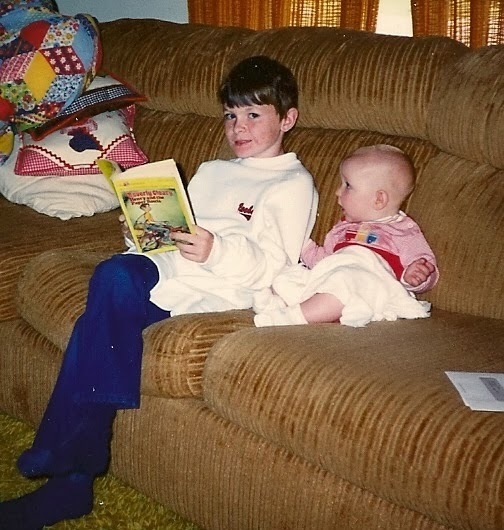 David age 8 reading to his baby brother Robert
David age 8 reading to his baby brother RobertOur impatient society demands instant results; we just have to persevere, pray without ceasing, and let the results speak for themselves. David graduated from homeschool, went on to college and earned not one but two bachelor's degrees. He is now a well-adjusted, happily married, productive member of society, and he and his lovely wife have been blessed with our first grandchild. Robert overcame learning challenges, graduated cum laude last December and is currently working on his master's degree. He too has a lovely wife. I believe both my sons would have turned out quite differently had they gone through the public/government school program.
In making the decision to homeschool, if the decision is a commitment (not unlike marriage), then God will grant us the strength we need to make it through the tough times that are bound to come, either from "outside" criticism or from challenges faced as families learn and grow together. Homeschooling is not just for the children, after all. I still can’t believe all the things it has given me the courage to do, including the homeschool band I started from scratch and taught for sixteen years.
I will never regret our homeschooling years. My only regret is that I wasn’t able to have more children so I wouldn’t have to end this wonderful roller coaster ride. May your journey be as blessed.
P.S. After listening Dr. Dobson's radio program on the early days of homeschooling several years ago, my husband came home from work, hugged me and apologized for not supporting me during those years of near-constant harassment from family and others....better late than never.
Published on September 20, 2013 07:24



